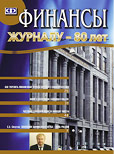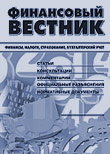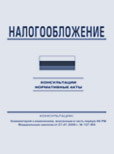Содержание
АКТУАЛЬНО
Р.Е. Артюхин, руководитель Казначейства России
E-mail: finance-journal@mail.ru
В начале декабря исполняется 30 лет с момента воссоздания казначейской системы России в соответствии с Указом Президента РФ от 08.12.1992 № 1556. В статье охарактеризованы этапы поступательного развития казначейской системы с отражением созданных на каждом из них актуальных для своего времени инструментов управления общественными финансами.
Ключевые слова: Казначейство России, казначейская система, казначейские технологии исполнения бюджета, кассовое обслуживание исполнения бюджетов, инструменты управления ликвидностью единого счета федерального бюджета, информационные технологии, система казначейских платежей.
ЮБИЛЕИ
В ноябре отмечают знаменательные даты – юбилей со дня рождения почетный президент Финансового университета при Правительстве Российской Федерации Алла Георгиевна Грязнова и выдающийся ученый, связавший свою жизнь на многие-многие годы с Финансовым университетом, Лидия Николаевна Красавина. В журнале публикуются поздравления данным ученым.
ФИНАНСЫ И БЮДЖЕТ: ПРОБЛЕМЫ И РЕШЕНИЯ
А.С. Ковалевская, ведущий научный сотрудник Центра международных финансов Научно-исследовательского финансового института Минфина России, кандидат экономических наук
E-mail: ankoval@nifi.ru
В статье анализируются глобальные инициативы в сфере организации гражданского участия в бюджетном процессе и методология оценки уровня вовлеченности общественности в бюджетный процесс. Рассматриваются примеры лучшей практики вовлечения граждан в бюджетный процесс в отдельных странах. Описаны формы, стандарты и принципы организации участия общественности в бюджетном процессе. Анализируется уровень гражданского участия в бюджетном процессе в России и даются рекомендации по его повышению в контексте рекомендаций международных организаций и глобальных инициатив.
Ключевые слова: участие граждан в бюджетном процессе, принципы организации гражданского участия, оценка уровня участия граждан в бюджетном процессе.
Т.Н. Седаш, доцент Департамента корпоративных финансов и корпоративного управления Финансового университета при Правительстве Российской Федерации, кандидат экономических наук
E-mail: tnsedash@fa.ru
Е.Б. Тютюкина, профессор Департамента корпоративных финансов и корпоративного управления Финансового университета при Правительстве Российской Федерации, доктор экономических наук
E-mail: ebtyutyukina@fa.ru
Предметом исследования в статье является финансовая ответственность организации, реализующей инвестиционный проект, перед публично-правовым образованием, являющимися сторонами соглашения о защите и поощрении капиталовложений. Целью исследования является разработка методических рекомендаций по определению убытков публично-правового образования в случае предоставления организации, реализующей инвестиционный проект, финансовой поддержки в виде бюджетных субсидий, бюджетных инвестиций, государственных гарантий, финансирования из Фонда национального благосостояния. Обосновано использование института убытков и его составных частей (реального ущерба и упущенной выгоды) при использовании каждого финансового инструмента. Предложенные подходы могут быть использованы при разработке методики определения убытков, которая должна быть разработана в соответствии с федеральным законом о защите и поощрении капиталовложений.
Ключевые слова: финансовая ответственность организации при реализации инвестиционного проекта, соглашение о защите и поощрении капиталовложений, убытки публично-правового образования.
НАЛОГИ: ТЕОРИЯ И ПРАКТИКА
Т.И. Семкина, старший научный сотрудник Центра налоговой политики Научно-исследовательского финансового института Министерства финансов РФ
E-mail: T.Semkina@nifi.ru
А.В. Сорокин, государственный советник РФ второго класса
Ю.А. Стешенко, старший научный сотрудник Центра налоговой политики, НИФИ, кандидат экономических наук
В статье анализируются налоговая и экономическая составляющие механизма взимания налога на имущество организации. Отмечается незначительная фискальная роль этого налога. Авторы приходят к выводу, что без пересмотра экономической составляющей меры по совершенствованию налоговой составляющей не дадут должного эффекта, что негативно отразится на механизме взимания налога на имущество организаций в целом. Предложенные в статье меры позволят сделать этот налог более эффективным.
Ключевые слова: налог, организации, недвижимое имущество, движимое имущество, налоговая составляющая, экономическая составляющая, кадастровая стоимость.
Н.С. Кострыкина, научный сотрудник ИПЭИ РАНХ и ГС
E-mail: Kostrykina-ns@ranera.ru
В соответствии с поручением Президента РФ от 20.05. 2022 Правительству РФ совместно с заинтересованными органами исполнительной власти субъектов РФ, с привлечением РСПП и ответственных участников консолидированных групп налогоплательщиков, надлежит рассмотреть вопрос о целесообразности сохранения в налоговом законодательстве РФ института КГН. В статье дан анализ существенных рисков, которые возникают как для государства, так и для бизнеса в случае окончательной отмены данного института, анализ, учитывающий зарубежный опыт.
Ключевые слова: консолидированные группы налогоплательщиков, КГН, налог на прибыль организаций, региональные бюджеты.
СТРАХОВАНИЕ
Э.С. Гребенщиков, кандидат исторических наук
E-mail: finvestnik@mail.ru
Аналитический обзор противоречивых итогов развития страхового рынка за первое полугодие 2022 г., текущей работы над законопроектом о долевом страховании жизни, который призван обеспечить страхованию жизни роль драйвера роста и источника долгосрочных инвестиций в экономику страны. В целом страховая отрасль успешно прошла период ковида и выдержала санкционное давление, причем во многом благодаря послаблениям со стороны регуляторов. Однако впереди у страховщиков докапитализация и возврат к исполнению прежних, то есть доковидных нормативов. Приоритет регуляторы отдают защите нарушаемых в массовом порядке прав страхователей.
Ключевые слова: форум лидеров рынка, динамика страховых премий и выплат, долевое страхование жизни, защита прав страхователей, санкционное давление, снижение платежеспособности клиентов, новые страховые продукты.
ФИНАНСОВЫЕ РЫНКИ
В.А. Татьянников, доцент кафедры финансов, денежного обращения и кредита Уральского государственного экономического университета, кандидат экономических наук, доцент
E-mail: vat55@mail.ru
В настоящее время наблюдается тенденция на значительные глобальные преобразования, в ходе которых усиливается рыночная неопределенность и неизбежно возникают те или иные риски. В сложившихся условиях становится актуальным исследование возможностей хеджирования рисков неблагоприятного изменения цен на активы с помощью производных финансовых инструментов. Классическими биржевыми инструментами для хеджирования финансовых рисков являются фьючерсные и опционные контракты, на внебиржевом рынке широко используются форвардные контракты, различные свопы. Как правило, внебиржевые инструменты характеризуются индивидуальностью стратегий, а биржевым производным инструментам свойственна стандартность, большой объем операций.
В российской практике биржевого рынка использование опционных контрактов затруднено по причине их низкой ликвидности и недостаточного объема открытых позиций, в частности по акциям. В связи с этим наиболее предпочтительным для хеджирования от неблагоприятного изменения цены актива, в данной статье речь идет об акциях российских эмитентов, является использование фьючерсных контрактов. Задачей настоящего исследования стал анализ возможностей хеджирования портфеля ценных бумаг фьючерсными контрактами, обращающимися на ПАО «Московская биржа». В работе использованы методы: наблюдения, сравнения, измерения, эксперимента.
В результате исследования выявлены практические возможности хеджирования фьючерсными контрактами портфеля ценных бумаг, сохранения активов инвесторов в условиях повышенной рыночной неопределенности.
Ключевые слова: биржевой рынок, портфель ценных бумаг, производный финансовый инструмент, хеджирование, риски.
ФИНАНСЫ СОЦИАЛЬНОЙ СФЕРЫ
И.В. Балынин, доцент Департамента общественных финансов Финансового факультета Финансового университета при Правительстве Российской Федерации, кандидат экономических наук
E-mail: igorbalynin@mail.ru
В статье представлены результаты оценки хода достижения целей Стратегии долгосрочного развития пенсионной системы Российской Федерации до 2030 года, в том числе даны прогнозы на 2023–2025 гг. Даны предложения по максимизации предпринимаемых мер по обеспечению достижения целей Стратегии долгосрочного развития пенсионной системы Российской Федерации до 2030 года, в том числе в части использования программно-целевых инструментов управления расходами на пенсионное обеспечение.
Ключевые слова: пенсионное обеспечение, пенсия, страховая пенсия, обязательное пенсионное страхование, бедность, сбалансированность бюджета.
ФИНАНСЫ ЗАРУБЕЖНЫХ СТРАН
Л.В. Палинкаш, сотрудник экономического факультета МГУ
E-mail: LPalinkash@yandex.ru
Статья посвящена развитию кредитного страхования в КНР. Рассматриваются сущность и значение кредитного страхования для внешнеэкономической деятельности, конкретные риски, включая политические, покрываемые кредитным страхованием в отдельной стране и в мире, конкуренция между банками и страховщиками в данной сфере, этапы становления и эволюции кредитного страхования в Китае, создание экспортно-кредитного агентства по страхованию SINOSURE, его функции и страховые продукты, а также деятельность мировых лидеров кредитного страхования, роль рейтинговых агентств.
Ключевые слова: кредитное страхование, экспортно-кредитное агентство, коммерческие риски, политически риски, страховые суммы, Бернский союз страховщиков.
Content
TOPICAL
R.E.Artuchin, head of the Russian Treasury
E-mail: finance-journal@mail.ru
The beginning of December marks the 30th anniversary of the re-establishment of the treasury system of Russia in accordance with the Decree of the President of the Russian Federation dated 08.12.1992 No. 1556. The article describes the stages of progressive development of the treasury system embracing the tools of public finance management created at each of them relevant for its time.
Keywords: treasury of Russia, treasury system, treasury technologies for budget execution, cash services for budget execution, tools for managing the liquidity of the unified federal budget account, information technology, treasury payments system.
E-mail: finance-journal@mail.ru
In November, significant dates are celebrated – the anniversary of the birth of the honorary president of the Financial university under the Government of the Russian Federation Alla Georgievna Gryaznova and an outstanding scientist who linked her life for many, many years with the Financial university, Lidia Nikolaevna Krasavina. Congratulations to these scientists published in the journal.
FINANCE AND BUDGET: PROBLEMS AND SOLUTIONS
A.S. Kovalevskaya, leading researcher at the Center for international finance of the Financial research institute of the Ministry of finance of the Russian Federation, candidate of economic sciences
E-mail: ankoval@nifi.ru
The article analyzes global initiatives in the field of organizing civic participation in the budget process and the methodology for assessing the level of public involvement in the budget process. Examples of the best practice of involving citizens in the budget process in individual countries are considered. The forms, standards and principles of organizing public participation in the budget process described. The level of civic participation measured and recommendations made to increase it in the context of recommendations of international organizations and global initiatives.
Keywords: citizens' participation in the budget process, principles of organizing civic participation, assessment of the level of citizens' participation in the budget process.
T.N. Sedash, associate professor, department of corporate finance and corporate governance, Finance university under the Government of the Russian Federation
E-mail: tnsedash@fa.ru
E.B. Tyutyukina, professor, department of corporate finance and corporate governance, Finance university under the Government of the Russian Federation
E-mail: ebtyutyukina@fa.ru
The subject of research is the financial responsibility of the organization implementing the investment project to the public legal entity that is the parties to the agreement on the protection and promotion of investment. The purpose of the study is to develop methodological recommendations for determining the losses of a public legal entity in the event that an organization implementing an investment project is provided with financial support in the form of budget subsidies, budget investments, state guarantees, funding from the Russian national wealth fund. The use of the institution of losses and its components (actual damage and lost profits) when using each financial instrument is substantiated. The proposed approaches can be used in developing a methodology for determining losses, which should be developed in accordance with the Federal law on the protection and promotion of investments.
Keywords: financial responsibility of the organization in the implementation of an investment project, an agreement on the protection and promotion of capital investments, losses of a public legal entity.
TAXES: THEORY AND PRACTICE
D.I. Ryakhovsky, head of the Department of taxes and tax administration of the Faculty of taxes, audit and business analysis of the Financial university under the Government of the Russian Federation, doctor of economics, full associate professor
E-mail: DIryahovskiy@fa.ru
A.Y. Akulov, leading researcher at the Department, candidate of economics, full associate professor.
E-mail: andrewakulov@yandex.ru
The article actualizes the problems of ensuring the effectiveness of the organizational and economic mechanisms of bankruptcy, which the Federal tax service of Russia faces in the status of an authorized body for protecting the interests of the Russian Federation as a creditor. Based on the results of expert analysis and generalization of judicial practice, the authors identified main reasons for the long-term low indicators of the degree of satisfaction of creditors' claims. To achieve this aim, they classified the results of bankruptcy procedures into two groups: general economic pre-bankruptcy factors and direct factors of bankruptcy procedures. Priority areas have been identified that might contribute to improving the efficiency and pay-off from implementation of bankruptcy procedures.
Keywords: effectiveness of bankruptcy procedures, authorized body, organizational and economic mechanism of bankruptcy, tax debtor.
T.I. Semkina, senior researcher at the tax policy center of the Research financial institute of the Ministry of finance of the Russian Federation
E-mail: T.Semkina@nifi.ru
A.V. Sorokin, state councilor of the Russian Federation, second class
Yu.A. Steshenko, senior researcher at the tax policy center, NIFI, candidate of economic sciences
The article analyzes the tax and economic components of the mechanism of collecting property tax of the organization. The insignificant fiscal role at present time of this tax is noted. The authors come to the conclusion that without a revision of the economic component, measures to improve the tax collection will not achieve proper effect, and this will negatively affect the mechanism of collecting property tax on organizations on the whole. The measures proposed in the article will make this tax more effective.
Keywords: tax, organizations, immovable property, movable property, tax component, economic component, cadastral value.
N.S. Kostrykina, researcher at IPEI RANH and GS
E-mail: Kostrykina-ns@ranera.ru
In accordance with the instruction of the President of the Russian Federation dated 20.05.2022, the Government of the Russian Federation, together with the interested executive authorities of the subjects of the Russian Federation, with the involvement of the RSPP and responsible participants of consolidated groups of taxpayers, should consider the expediency of preserving the institute of REAG in the tax legislation of the Russian Federation. The article provides an analysis of the significant risks that arise both for the state and for business in the event of the final abolition of this institution, an analysis taking into account foreign experience.
Keywords: consolidated groups of taxpayers, REAG, corporate income tax, regional budgets.
INSURANCE
E.S. Grebenshchikov, candidate of historical sciences
E-mail: finvestnik@mail.ru
An analytical review of the contradictory results of the development of the insurance market for the first half of 2022, the ongoing work on the draft law on unit – linked (long term life insurance), which is designed to ensure the role of life insurance as a driver of growth and a source of long-term investments in the country's economy. In general, the insurance industry has successfully passed the covid period and withstood the sanctions pressure, largely thanks to the easing of regulatory pressure. However, insurers have to go through recapitalization and return to the implementation of the previous standards which existed before covid. Regulators meanwhile started to priorities the protection of the rights of policyholders violated en masse.
Keywords: forum of market leaders, dynamics of insurance premiums and payouts, shared life investment insurance, protection of policyholders' rights, sanctions pressure, reduction of customers' solvency, new insurance products.
FINANCIAL MARKETS
V.A. Tatyannikov, associate professor of the department of finance, money circulation and credit of the Ural state university of economics, candidate of economic sciences, associate professor
E-mail: vat55@mail.ru
Currently there is a trend towards significant global transformations, during which market uncertainty increases and some risks inevitably arise. It becomes relevant to study the possibilities of hedging the risks of adverse changes in asset prices with the help of derivative financial instruments. Futures and options contracts are classic exchange instruments for hedging financial risks; forward contracts and various swaps are widely used in the over-the-counter market. As a rule, over-the-counter instruments are characterized by individual strategies, while exchange-traded derivatives are marked by standardity and a large volume of transactions. In the Russian practice of the exchange market, the use of option contracts is difficult due to their low liquidity and insufficient volume of open positions, in particular for shares. In this regard, the most preferable way for hedging against an unfavorable change in the price of an asset, and in this article we are talking about shares of Russian issuers, is the use of futures contracts. The objective of this study are the possibilities of hedging a portfolio of securities with futures contracts traded on PJSC Moscow Exchange. The following methods were used in the work: observation, comparison, measurement, experiment. As a result, the practical possibilities of hedging a portfolio of securities with futures contracts, preserving investors' assets in conditions of increased market uncertainty have been identified.
Keywords:stock market; portfolio of securities; derivative financial instrument; hedging; risks.
FINANCES OF THE SOCIAL SPHERE
I.V. Balynin, associate professor of the Department of public finance of the finance faculty of the Financial university under the Government of the Russian Federation, candidate of economic sciences
E-mail: igorbalynin@mail.ru
The article presents the results of the assessment of the progress in achieving the goals of the strategy for the long-term development of the pension system of the Russian Federation until 2030, including forecasts for 2023-2025. Proposals are made to maximize the measures taken to ensure the achievement of these goals including the use of program-targeted tools for managing pension costs.
Keywords: pension provision, pension, insurance pension, compulsory pension insurance, poverty, budget balance.
FINANCES OF FOREIGN COUNTRIES
L.V. Palinkash, member of the Faculty of economics, Moscow State University
E-mail: LPalinkash@yandex.ru
The article is devoted to the development of credit insurance in China. It is about the essence and importance of credit insurance for foreign economic activity, specific risks, including political ones, covered by credit insurance in a particular country and in the world, competition between banks and insurers in this area, the stages of formation and evolution of credit insurance in China. The special focus is on the emergence of the export credit insurance agency SINOSURE, its functions and insurance products, and also, current activities of world leaders in credit insurance, the role of rating agencies.
Keywords: credit insurance, export credit agency, commercial risks, political risks, insurance amounts, Berne Union of Insurers.











